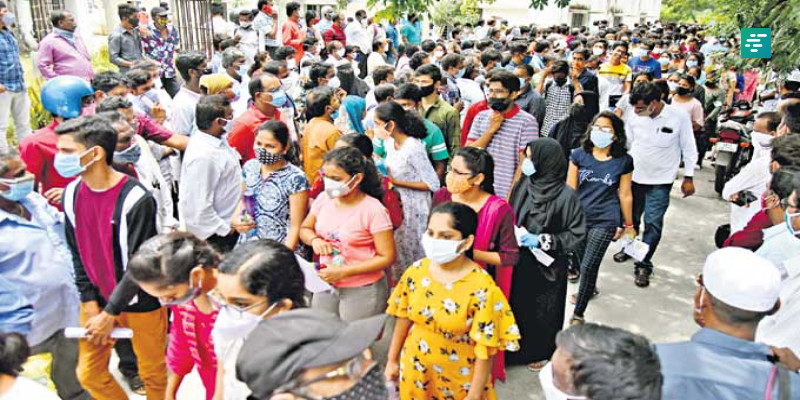
6000 students stuck in universities without recognition, Telangana govt finally acts
- Campus Updates
- 13 Jul, 2023
- 519
The Telangana government approved recommendations made by the Telangana State Council for Higher Education (TSCHE) on Wednesday, July 12, to accommodate students from Guru Nanak University (GNU) and Sreenidhi University in Osmania University, constituent colleges of Jawaharlal Nehru Technological University (JNTU-H) and other private universities. The move comes after nearly 6000 students in the state were enrolled in these institutions in August 2022 despite the fact that they did not have recognition.
Both the universities along with three others – Kaveri University (Siddipet district), NICMAR institute of construction studies (Medchal-Malkajgiri district) and MNR University (Sangareddy district) – were a part of 2022 amendment to the Telangana State Private Universities (Establishment and Regulation) Act, 2018. As per the 2022 amendment to the 2018 Act, the above universities were added under Section 3. While the state legislature passed the amendment, Telangana Governor Dr Tamilisai Soundararajan hasn’t signed it as of yet.
While Kaveri, NICMAR and MNR universities are yet to start admissions, the remaining two universities set up websites, advertised on local channels and started calling for admissions. Parents who were unaware that the institutions were, at the time of enrollment, illegal, went ahead with admissions.
“At the time of admission to Guru Nanak University, we were shown the document which was passed in the legislature. We were unaware that a Governor’s signature was necessary. Hence we enrolled our son there,” CVS Narayana, a resident of Siddipet told.
Narayana said that he had paid around Rs 2 lakh for his son's first semester fee only to find his education halted nine months later. Narayana, like several other parents were, at the time of admission, were either led to believe that the university was legitimate or the conversation didn’t come up at all.
Arvapally Narsimha, a resident of Gudipally village in Nalgonda, enrolled his daughter Anjali to the BSc Agriculture program at GNU. Including costs for equipment and fees, Narsimha paid around Rs 50,000.
“I was stunned when I discovered that the university isn’t legitimate. We thought a university would be more legitimate than an ordinary college and hence enrolled my daughter. I attended several meetings, made several calls after which I found it easier to just take back my daughter’s documents and withdraw from GNU,” he said.
Narsimha’s daughter Anjali who was admitted via lateral entry is now studying at Greenfields institute of agriculture research and training in Ibrahimpatnam.
When several students protested outside the two campuses on June 22, police officials resorted to use of force and dispersed the crowd. Telangana Education minister Sabitha Indra Reddy said the students would be accommodated in several other universities. In a meeting held by the Telangana State Council for Higher Education (TSCHE) on Tuesday, July 11, officials decided to accommodate the students in constituent colleges.
State government’s negligence?
“In ideal circumstances, either state Education Minister or the higher education department should have intervened and stopped the enrolments, the minute it began,” said Telangana Congress’ student wing, National Students Union of India (NSUI) president Venkat Balmoor.
Balmoor alleged that the state government was passing the blame onto the Governor. “It is easy to shirk off responsibility and say the Governor has halted the Bill. It was evident that the admission process started. All Telugu TV channels were advertising the institutions. Why didn’t the government intervene then and there?” he asked.
Governor’s involvement
Bharat Rashtra Samithi (BRS) working president and state industries and IT minister KT Rama Rao had criticized the Governor several times, among other issues, for not clearing the bills pending before her office.
Aside from the Private Universities Bill, the Telangana Governor has been accused of sitting on several other state legislations. However, Governor Tamilisai on Monday, July 10 remarked that no bill was pending with her office. The Governor’s office has supposedly returned the Private Universities Bill to the state government seeking further clarifications.
A former member of the Telangana State Council for Higher Education (TSCHE) brought up a separate concern. “Aside from government negligence, it is also important to look at institutional greed. Universities are currently enrolling students quickly, with an intent to fill up seats and make more money. Unlike the brown field approach, universities under the greenfield approach have complete autonomy to function however they want. There isn’t any need to implement reservations, these institutions have complete freedom in collecting exorbitant fees and can accommodate as many seats as they wish to do so,” he said.
Subsection 3, Section 32, of the Act in question says, “The University shall have full autonomy, along with full disclosure and transparency, on setting fees for the various programmes that it decides to offer. Fees shall be determined by each University through a Fee Fixation Committee which would consist of members drawn from the Board of Management, Academic Council, as well as external members. The Fee Fixation Committee shall be headed by a member of the Board of Management.”
At the time of writing this article, no official from GNU or Sreenidhi University commented on whether a Fee Fixation Committee was constituted or not.
However, the students currently being accommodated to other institutions will have to abide by the same fee structure as that at Guru Nanak University and Sreenidhi University. Further, the fee originally fixed by Guru Nanak institution will be in place for the rest of the study period.
